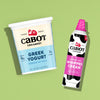
Love Greek Yogurt? Here’s How Much Protein You’re Actually Getting
Brierley Horton, M.S., RD is a dietitian nutritionist, content creator and strategist, and avid mental health advocate. She is co-host and co-creator of the Happy Eating podcast, which breaks down the connection between food and mental wellness.
Let’s get my bias out of the way now: we eat a lot of Greek yogurt in our house. We’re partial to full-fat and reduced-fat varieties (sorry, nonfat!), so Cabot’s Greek yogurts are often in our refrigerator because those are the varieties they offer.
One of the main reasons we lean so heavily on Greek yogurt is for its protein content—some brands, including Cabot’s, have twice the protein content of regular yogurt. (Read more about the protein content of Greek yogurt in the FAQ below.)
On the subject of protein, you might be asking why don’t you lean more on cottage cheese? After all, cup-for-cup it’s ever-so-slightly higher in protein—delivering 22 to 28 grams of protein. Well, not only is cottage cheese less popular among my younger roommates (aka my daughters), but it also doesn’t blend into dishes in the same way that yogurt does.
Another popular dairy staple in our house is sour cream: protein-wise sour cream is on par with regular yogurt. And while delicious, and beloved by my daughters, the tang of sour cream is hard to hide in some recipes (trust me, I’ve tried!).
Greek yogurt also delivers more protein per serving than an egg, a very popular breakfast protein. A single egg has a little over 6 grams protein—essentially what you’d get in one-third or a 1/2 cup of Greek yogurt. (See how eggs and yogurt stack up against each other in the FAQ below.)
All of this said, it’s important to me—as both a dietitian and a realist—that we don’t lose sight of the bigger picture. Every food I’ve mentioned here is a whole food. None are ultra-processed or filled with ingredients we’re trying to avoid. So if eggs are what you and your family love most, enjoy them. The same goes for regular yogurt. And if Greek yogurt is your jam? Even better.
We eat plenty of Greek yogurt as a standalone item in our house, but I also blend it into smoothies, fold it into our banana bread batter, and make healthier frozen treats out of it! Here are some of my favorite Cabot recipes featuring Greek yogurt to spark your next kitchen inspiration:
Blueberry Yum Yum Smoothie
I make a very similar version of this Blueberry Yum Yum Smoothie at home most mornings. I skip the banana and use Cabot’s Vanilla Bean Greek yogurt instead of plain. Don’t forget the cinnamon: it’s the secret MVP!
Vanilla Yogurt Overnight Oats
The toppings combo in this Vanilla Yogurt Overnight Oats recipe is perfect for fall! But this recipe is flexible enough to stand up to any other fruit combo you prefer, or have on hand already.
Berry Smoothie Bowl with Yogurt
If boosting your protein intake is something you’re striving for (I mean, who isn’t right now?), be generous with those chia seeds and sliced almonds in this Berry Smoothie Bowl with Yogurt.
Strawberry Shortcake Yogurt Parfait
While the recipe calls for Girl Scout Trefoil cookies, any shortbread cookie will work in this recipe so choose one that you love most and use it. Strawberry Shortcake Yogurt Parfaits are sure to be a new family favorite.
Protein-Packed Chocolate Yogurt Crunch
This Protein-Packed Chocolate Yogurt Crunch recipe is hugely popular in our house both for a special after-school snack and dessert.
Greek Yogurt Tzatziki
For a savory yogurt-based dish this traditional Mediterranean Tzatziki made with Greek yogurt packs in flavorful protein and other nutrients and is a welcome addition any party table.
Greek Yogurt Mashed Potatoes
If you’d like to make your mashed potatoes a little creamier while keeping the calorie count down and protein up, then add a little Greek Yogurt. That’s the idea behind Cabot's Greek Yogurt Mashed Potatoes—they’re just as creamy and fluffy as regular mashed potatoes, but they’re a little healthier and lighter.
More Cheese Please
Sign up for more helpful articles, recipes and updates from Cabot! Plus get 15% off your first purchase.














